IMG’s Richard Bayliss explains how his team remotely produces upwards of 30 EFL matches each weekend
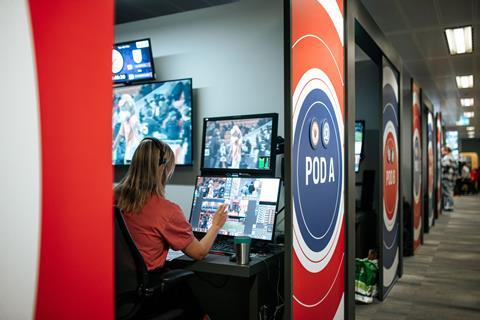
IMG has created (and is continually honing) a large-scale remote production facility at Stockley Park, to produce a huge number of English Football League matches across its divisions and competitions, including the Championship, League One, League Two, League Cup, and EFL Trophy.
The remote operations have been in place for several years, but, for the 24/25 season, IMG further enhanced production values with additional cameras and crew.
Broadcast Sport caught up with Richard Bayliss, VP, head of football content at IMG to talk about how the sports giant now creates content from each match.
Bayliss explains: “For season 24/25, we’ve uplifted the workflows for EFL. It’s always been very much on the cutting edge of what’s possible in terms of remote production, but this year, we’ve really pushed it further again. There are now six cameras on most Championship games, four cameras on League One games and two cameras on League Two matches.
“That increase in spec has been primarily due to an increased importance for the EFL to ensure a standard for all matches, not only for its broadcasters, but also for clubs and viewers, both domestically and internationally.”
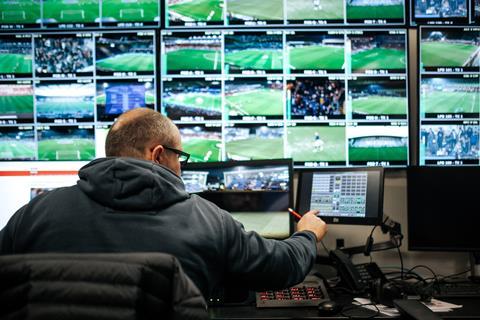
The operation
The Championship and League One games are directed and produced within “pods” that each have two people in – a director and a replay operator. Between them, they direct the cameras, speaking to the camera operators, and implement both replays and graphics.
For League Two, there’s one operator that does the same role, speaking to the two camera operators on site, and turning around replays and graphics.
Bayliss says: “We often say that particular role, directing League Two matches, is the hardest in the building, because they are doing every single aspect you can think of when it comes to the broadcast and it’s super impressive.”
The remote productions are run on an application called Simply Live, which provides the remote operators with “everything at their fingertips” to enable switching cameras or replays and implementing graphics. Simply Live links up with IMG’s graphics engine Hyper and is “incredibly intuitive for operators, so that they can tell that story at the touch of a button,” says Bayliss.
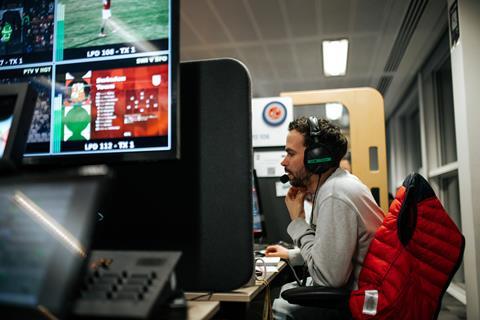
The live camera feed from each match is delivered to IMG via each of the connected stadiums. “Such a big piece of the puzzle for us is the fact that all 72 venues in the EFL across those three leagues are connected venues,” says Bayliss. “Bringing lines out of each stadium, through our partnership with NEP Connect, we’re able to bring those feeds into the building, and from there, it’s how we can slice, dice, direct, produce and ultimately tell the story of every game across the EFL.”
Prior to each match, the match directors at Stockley Park talk to the camera operators to plan and discuss what the key story lines are, the players to follow, and what fans are likely to see during the match. “We’ve got some fantastic operators who do their preparation and research and ultimately have the experience to tell the right story,” says Bayliss. ”It goes without saying that the fewer cameras you have, the fewer ways to tell that story, but actually, that can help focus on what’s important for the viewer. And whether you have two cameras or 22 cameras, the story of a football match is ultimately what we’re trying to tell.”
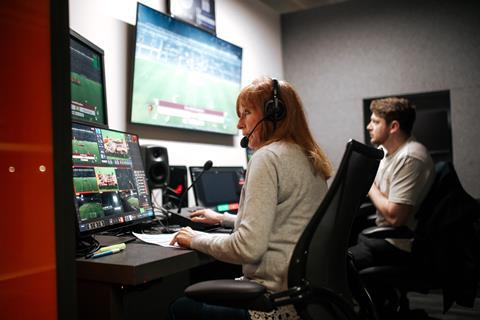
The Talent
The directors and replay operators working on the EFL remote productions at IMG are a mix of highly experienced and junior operators. Some have come from the world of outside broadcast and have worked in galleries with 18 to 20 people, while others are new to the game.
Bayliss said: “Our setup is tailor-made for both the experienced and the new operators coming into the production setup. One of the things we’re really proud of is the diversity of pathways that people come in from – we’re able to combine extremely experienced directors with fresh, up and coming storytellers. There’s no set path that you have to follow – people come into the building as an editor or a producer, or maybe even more junior than that, entering the industry for the first time, and we would never say you must start here to get there.”
He continues: “Often, we might have someone who has experience as a replay operator, or maybe they’ve been an editor, but we can steer them towards directing, either through sitting them down on a League Two match and giving them that experience, or by sitting them next to an experienced director as a replay operator on the Championship or League One.
“Everybody brings something different to the production, and that’s something we want to celebrate, so we can tailor pathways depending on those skill sets and aspirations.”
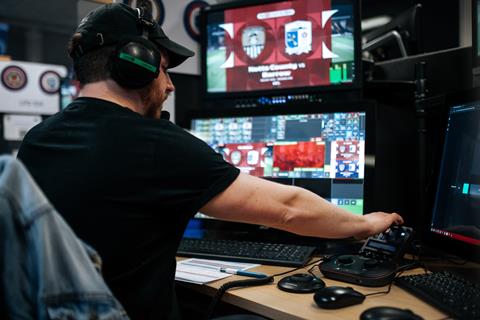
The Scale
When Broadcast Sport chatted to Bayliss, it was the Friday immediately before the final weekend of EFL matches for the 24/25 season. That weekend, for the final match day, there were 36 matches in total, with Sky doing its own outside broadcasts for some and IMG producing all the others. On a typical Saturday during the football season, IMG will cover in excess of 30 EFL matches live.
Its role on each match includes editorial oversight, production management, engineering support and master control. And, as well as producing the live matches, IMG also creates highlights packages for each game.
Bayliss laughs and says: “I feel like we should almost have a big EFL logo as you walk into the area and our tagline underneath should be, ‘There’s a hell of a lot going on’. The sheer volume of football coming in and then going out of the building on an EFL Match Day is huge and we’ve got the facilities to be able to direct and produce those games and to add remote commentary if required as well, all in the building.”
For the highlights, IMG uses a combination of human and AI input. “We think that’s the perfect balance right now,” says Bayliss. ”We’re using Premiere Pro, and then some software called Helmet, which enables sequences and edits to be set up in a consistent way from match-to-match, operator-to-operator. AI is brilliant in being able to compile and clip moments, but we really want to make sure that we are telling the story of a match editorially, not just adding up clips to a set duration.”
Comments from the EFL production team:
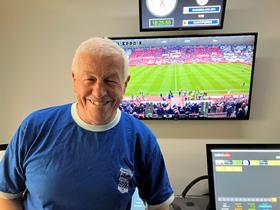
John Watts: “I began directing matches in the 80’s, including World Cups and Champions League finals, and have seen many changes mostly based on improved technology relating to cameras and lenses, replay systems and specialist cameras. Until I worked on the EFL, all my directing experience had been on site, not like the remote operation that is the EFL, but the engineering here is so good you soon forget you are at IMG’s Stockley Park studios.
“This operation has evolved over the past years with the cameramen gaining confidence and learning the requirements of individual directors, and we are all different. The replay operators have also grown in confidence and experience and now multi task brilliantly providing replays, graphics and half and full time highlights, plus operating the 16 metre remotes.
“The system is ideal for giving new directors and replay operators a great grounding in how to direct live football. I don’t know a better way to give people a chance to learn the basics. We now have replay operators directing and junior staff starting off in the replay chair. There is a great feeling in helping some of the operators develop, learning the correct order of replays, building packages to insert in quiet periods of the game etc.
“These relationships are not one way as sharing knowledge and ideas certainly makes me think more about how I am covering a game and I encourage input from any of the crew which again is a help to me and the product we are producing. This season we have the addition of the commentators. I like to offer them observations as well as replays and stats, and encourage the replay ops to pay attention to what the commentators are talking about so that we can illustrate this in the coverage.”
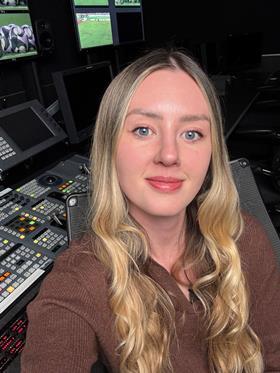
Sarah McLaughlin: “There’s honestly nowhere else in the country where you can direct football at this level without already having decades of experience under your belt. The setup at IMG makes top-level production feel accessible in a way that just doesn’t exist elsewhere – it opens the door for so many of us to learn by doing, which is incredibly rare.
“I never thought I could work in football – I was actually warned off it early on in my career – but IMG has completely changed that for me. It’s been the most amazing environment to grow in, with a team that not only shares a huge amount of knowledge but also gives you the freedom to take creative risks and really own your role.”
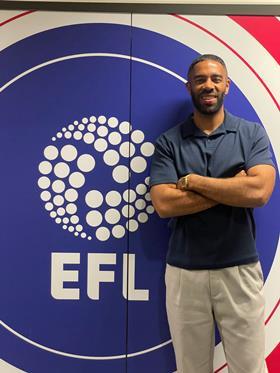
Tyrone White: “After nearly a decade at BT Sport, I went freelance in 2022. I have predominantly been VT co-ording for both match and presentation, while also producing and directing world feed galleries. It was through working on other IMG productions that I got the opportunity to step into directing, something that felt like a natural progression after years in VT. It can be difficult to make that step up, especially with limited chances to direct football matches in the UK, but the EFL has provided an incredible platform to do just that.
“This season, I’ve directed 25 games across the Championship, League One, and the Carabao Cup, many of which have aired live on the Sky Sports Plus app and CBS in the U.S. The more games you do, the more you build confidence and start to hone your own directing style - knowing when to cut, how to build tension, how to let moments breathe and how to best convey the story of a match to the viewer. I’ve been trusted with several high-profile fixtures and have learned a huge amount, while also regularly reviewing my own matches back and shadowing experienced directors. There’s a real sense of growth and momentum, and I’ve genuinely loved every minute of it.”





No comments yet